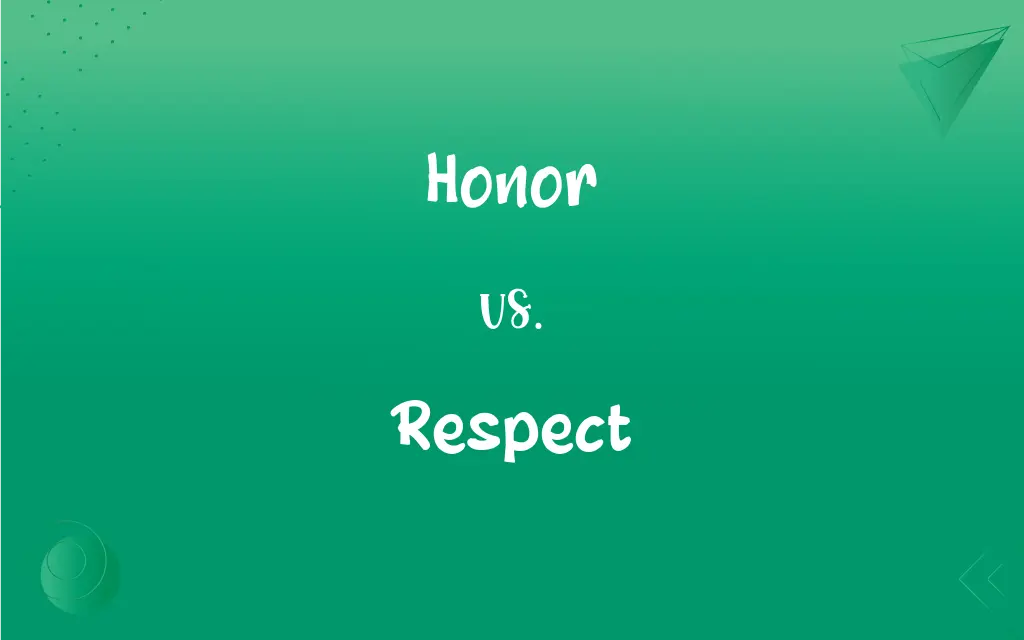Honor vs. Respect: What's the Difference?
Edited by Aimie Carlson || By Harlon Moss || Updated on October 20, 2023
Honor is a recognition of value or excellence; respect is a feeling of admiration or deference.

Key Differences
Honor and respect are two concepts often used interchangeably, but they possess distinct meanings. Honor typically signifies a deep admiration or esteem for someone based on their deeds, character, or position. Respect, on the other hand, is a feeling or understanding that someone or something is valuable, important, and worthy, not necessarily due to achievements.
Honor often comes as a result of one's achievements, character, or societal contributions. For instance, a soldier might be honored for his bravery, or a scientist might be honored for groundbreaking research. Respect is more foundational and can be felt for anyone, regardless of their accomplishments. Even without knowing a person's achievements, one can show them respect because they believe in the intrinsic value of that individual.
In societal dynamics, honor is something that can be earned, lost, and regained based on one's actions. When a person acts with integrity and uprightness, they earn honor. Conversely, dishonorable actions can strip one of their honor. Respect, while it can also be earned or lost, tends to be more stable and is often linked to basic human dignity.
Another notable distinction is that honor can be both a noun and a verb in the English language. As a verb, it means to regard with great respect or to fulfill an obligation or keep an agreement. Respect, predominantly used as a noun, denotes feelings of deep admiration for someone due to their qualities or achievements.
Comparison Chart
Nature
Recognition of value or excellence
Admiration or deference
ADVERTISEMENT
Basis
Achievements, character, societal contributions
Intrinsic value, understanding someone/something is worthy
In Language
Can be both a noun and a verb
Predominantly a noun
In Society
Can be earned, lost, and regained
More stable, linked to human dignity
Common Application
Given for bravery, research, or due to a position/status
Shown to anyone, regardless of accomplishments
Honor and Respect Definitions
Honor
Adherence to what is right.
She acted with honor throughout the ordeal.
ADVERTISEMENT
Respect
A feeling of deep admiration for someone or something.
She had immense respect for her mentor's wisdom.
Honor
High respect or esteem.
The firefighter was held in great honor in his community.
Respect
Polite greetings or regard.
Give my respect to your family.
Honor
A privilege or distinction.
It is an honor to be invited to speak at the event.
Respect
Avoidance of harm or interference.
Out of respect for the deceased, they held a moment of silence.
Honor
A person or thing that brings credit.
Their charitable works are an honor to their community.
Respect
The state of being admired.
He earned the respect of his peers with his dedication.
Honor
To regard with great respect.
They chose to honor the agreement despite the challenges.
Respect
Consideration for the feelings, wishes, or rights of others.
They treated each other with respect despite their differences.
Honor
High respect, as that shown for special merit; recognition or esteem
The honor shown to a Nobel laureate.
The place of honor at the table.
Respect
A feeling of appreciative, often deferential regard; esteem
I have great respect for your work.
FAQs
How does respect relate to human dignity?
Respect is often linked to basic human dignity, valuing individuals inherently.
What does honor primarily signify?
Honor primarily signifies a deep admiration or esteem for someone based on their deeds, character, or position.
Can honor be lost?
Yes, honor can be lost and regained based on one's actions.
Can honor be used as a verb?
Yes, to "honor" can mean to regard with great respect or fulfill an obligation.
Is respect mainly a noun?
Yes, respect is predominantly used as a noun in English.
Is respect based on achievements?
Respect is a feeling for anyone, regardless of their accomplishments, recognizing their intrinsic value.
Can one respect nature?
Absolutely, one can have deep admiration and respect for the natural world.
How can one show respect to others?
One can show respect by valuing others' feelings, wishes, and rights, and treating them with consideration.
Is honor more about external recognition?
Often, honor involves external recognition based on one's deeds or character.
Are honor and respect synonymous?
While often used interchangeably, they have distinct meanings; honor is about recognition, while respect is about admiration or deference.
Does respect require agreement with someone's views?
No, one can show respect without necessarily agreeing with another's views.
Is honor often given in formal ceremonies?
Yes, honor is frequently recognized in formal ceremonies or awards.
Is honor always based on positive deeds?
Typically, honor is associated with positive deeds or upright character, though perceptions of what's "honorable" can vary.
Can everyone be given respect?
Yes, everyone can and should be shown respect based on their intrinsic value as individuals.
Can a privilege be considered an honor?
Yes, a privilege or distinction can be seen as an honor.
How is respect earned?
Respect is earned by demonstrating qualities or achievements that evoke admiration.
Can an action bring honor to a community?
Yes, actions that positively impact or represent a community can bring honor to it.
Can objects be treated with honor?
Yes, objects of significance or reverence can be treated with honor.
What's a simple way to show respect?
Listening actively and valuing others' opinions is a simple way to show respect.
Can respect be given silently?
Yes, respect can be silently conveyed through understanding and consideration.
About Author
Written by
Harlon MossHarlon is a seasoned quality moderator and accomplished content writer for Difference Wiki. An alumnus of the prestigious University of California, he earned his degree in Computer Science. Leveraging his academic background, Harlon brings a meticulous and informed perspective to his work, ensuring content accuracy and excellence.
Edited by
Aimie CarlsonAimie Carlson, holding a master's degree in English literature, is a fervent English language enthusiast. She lends her writing talents to Difference Wiki, a prominent website that specializes in comparisons, offering readers insightful analyses that both captivate and inform.







































































